#tejkohli
Explore tagged Tumblr posts
Photo

Technology being developed aims to bridge the gap between the high cost of treatment for corneal blindness and the unmet medical need in poor communities worldwide #TejKohli #CureBlindness #tejkohlifoundation https://bit.ly/36cW8lc https://www.instagram.com/p/B7iyDSSJOjS/?igshid=mrowq33sgije
0 notes
Text
Tej Kohli: Profile Of A Technologist
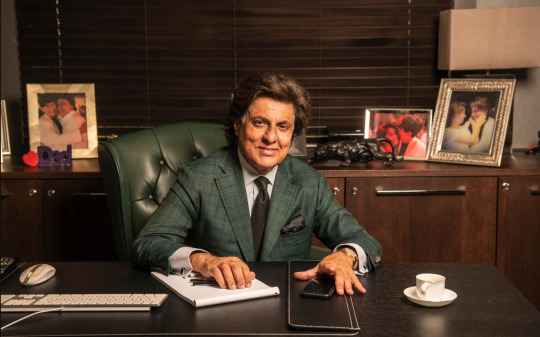
Tej Kohli is a philanthropist who is well known for his worldwide mission to eliminate corneal blindness from poor and underserved communities by 2035. In 2006 he sold a company that he had founded just seven years earlier as part of a high value sale. The company specialised in online payment gateways for high risk sectors and also in the acquisition, turnaround and trade sale of online gaming properties. Since this 2006 liquidity event Tej Kohli has been actively engaged in building the not-for-profit Tej Kohli Foundation.
Tej Kohli is also an impact investor focused on artificial intelligence, robotics and biotechnology ventures that have the potential to drive positive human impact. His impact investments include proprietary technologies that have the potential to have a transformation impact in a variety of applications. Ventures backed by Tej Kohli are engaged in activities ranging from resolving the treatment gap that leads to poverty-driven blindness through to solving the logistical challenges of organ donation and even using machine learning to dramatically increase the efficiency of plastics recycling.
Tej is a father to two teenagers and has been married to his wife Wendy for over twenty years. He is a keen esports fan and an unashamed supercar enthusiast. He is also an avid ballroom dancer who has competed in international events. Tej Kohli regularly shares his thoughts and wisdom in a series of #TejTalks blogs and is an active user of social media.
Here we find out more about the colourful technologist…
What is #TejTalks?
Tej Kohli - #TejTalks is where I share my thoughts and also important information about the things that matter to me or which have captured my attention. I blog using Medium and I also post a lot on Twitter and Facebook. I am not that well known and I am not a public figure, so I do not have much of a platform elsewhere. The beauty of place like Medium and to a lesser extent Twitter, is the ability to make unmediated connections with experts.
The Tej Kohli Foundation for example, is entirely depending on forming new partnerships and coalitions all around the world to solve big challenges. So #TejTalks is a great place to zone in onto some of the constitute parts of those challenges or the underlying factors that are causing them, and to connect and share ideas with relevant experts. A huge proportion of corneal blindness for example is a poverty-driven ailment, and so you cannot solve it without also looking at the underlying causes of poverty. Female inequality also plays a big role in poverty blindness, and so recently I have been learning and blogging about that too.
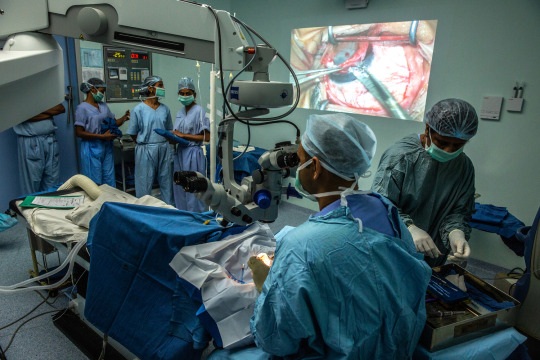
You recently published ‘Rebuilding You: The Philanthropy Handbook’. Why?
Tej Kohli - My own approach to philanthropy has been heaving focused on rebuilding people and communities around the world. And one of the things that I have learned on that journey is that in becoming a philanthropist you cannot simply become a kinder and more benevolent version of yourself. You also need to behave differently, think differently and change your outlook. I wrote ‘Rebuilding You’ as a guide for others who want to use their wealth for good, so that they can avoid some of the common pitfalls and have a greater impact more quickly.
I have organised the ‘Rebuilding You’ handbook into key decision areas. Each area will enable would-be philanthropists to combine some of my experiences with their own to synthesise new ideas about how to define a brand of philanthropy that will best achieve their goals.
What is the biggest lesson that you have learned during your career?
Tej Kohli - I am about to turn 63 and I have led a rollercoaster life. People often tell me that my life story would make a great movie, but I tell them that if it was a it would do badly it because the story would not seem believable! I made a single youthful mistake in 1988 that I have regretted ever since and which I still feel great remorse for. I think what that taught me is that sometimes the important thing is to know what not to do.
At the same time if you want to achieve something you need to aim higher and go further than almost every other person is prepared to go, and if you start young like I did, it is inevitable that you will make some mistakes. I feel bad for young people these days as so much of their lives are recorded and documented online. I counsel my kids and their friends to aim high but also to be very careful as any indiscretion could follow them forever.
But the biggest lesson I think I have learned is that you will always have your critics and not to let them detract from what you are doing. It’s best not to give them the satisfaction of allowing them to diminish who you are and what you are doing. The best thing to do is to simply keep going, keep doing good, keep giving back and keep helping others.
youtube
What for you have been the key moments in your life?
You know my mother is 86 now and if I am anything in life then I owe it to her. She has always been there for me and that consistent love and support has been more important to me than any particular moments, except of course for the birth of my son and daughter. I had my children quite late in life, but my kids are by far the thing that I am most proud of.
In terms of my career, my first job after graduating in Electrical Engineering from the Indian Institute of Technology was installing tachometers. I was installing at a facility owned by Rabocomtel and realised that I could design a process controlled which would significantly increase the efficiency of their facilities. It’s a long story, but ultimately, I was able to pitch the idea to the CEO who placed a big order with the company that I worked for. That gave me my first real affirmation of my desire to become an entrepreneur.
When the company that I launched in 1999 reached $100m of turnover was also a key moment for me too. It affirmed my belief in what was possible, and we quickly expanded to employ hundreds of software developers and began buying and turning around companies too. And obviously when that company was sold in 2006 it was a life changing moment.
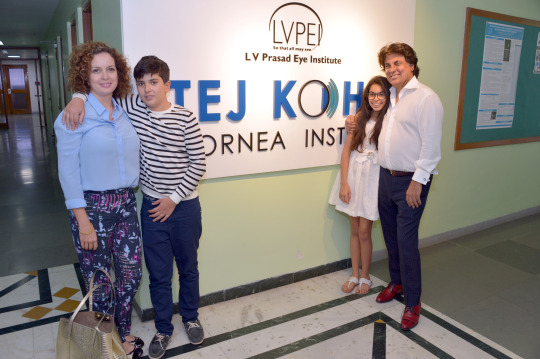
You graduated in from the Indian Institute of Technology with a degree in Electrical Engineering. Do you still consider yourself an engineer?
Tej Kohli - Today I would call myself a technologist, but I think that to be an engineer you now need to be a technologist and vice versa. It was 1980 when I graduated in Electrical Engineering and ‘technology’ as we know it today did not really exist. The Indian Institute of Technology (IIT) remains today one of the top educational institutions in the world and it has become famous for the problem-solving abilities of its engineers.
When the COVID-19 crisis hit in 2020, India found itself with a catastrophic shortage of ventilators, but within weeks engineers at IIT had created a low-cost ventilator that could be manufactured using off-the-shelf parts. They made their design open source so that local manufacturing companies could turn their resources to manufacturing ventilators, which they did. That is an elegant example of engineering and technology coming together.
In 2018 my alma mater conferred their Distinguished Alumnus Award upon me for serving society at large through my work at the Tej Kohli Foundation. That made me proud because part of what we do at the Foundation is to deploy technology to solve human problems.
Who has inspired you most in life?
Tej Kohli - The late Kofi Annan was by far the wisest and most inspirational man that I have ever met. But from a more practical perspective, as obvious as it may sound, I greatly admire Bill Gates. The Bill and Melinda Gates Foundation approach to philanthropy has set a high standard to which all other philanthropists can aspire. The way that Bill Gates defined very specific objectives and then intensively targeted vast resources into both grassroots activities and also major scientific innovations, has been a big source of learning for me that has continually motivated and inspired me to do even more. Bill Gates achieved so much in business and then used that success to achieve so much for others that like me he has almost had ‘two lives’. His example is a wake-up call for any human who has accumulated wealth to consider how they might use that wealth for the betterment of their fellow human beings.
I am also greatly indebted to Michael Milken. His story resonates strongly with me because Milken got ‘tripped up’ by his prodigious early success, but then made a colossal comeback and focused on using his success to help others. Today Milken is one of the biggest funders of research into prostate cancer, and the results are incredible. In 2004 Fortune Magazine called Milken ‘The Man Who Changed Medicine’. Milken shows that it is possible to move on from past youthful mistakes and rebuild yourself for the betterment of other people.
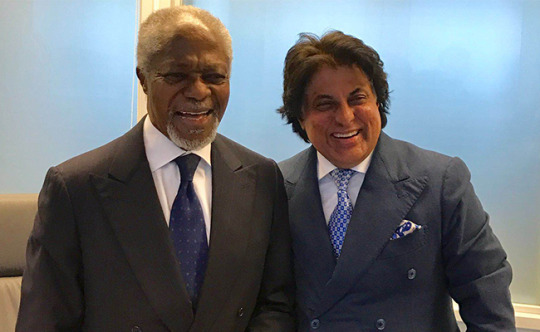
You have been at the helm of the Tej Kohli Foundation for well over a decade. When did your philanthropic ambitions start?
Tej Kohli - It was my wife Wendy who started off our journey into philanthropy when in 2005 we sponsored a group of disabled children in Costa Rica. By 2005 we knew that a sale of my company was imminent, and we wanted to have something new to put all of our energies into. The group of disabled children that we committed to help had varying levels of disability, and our job was to make interventions that would improve their lives. Some had such severe disability that they would need permanent care for the rest of their lives. At the opposite end of the spectrum, with our support one young girl eventually attended college in the USA.
That same year my wife Wendy launched the ‘Funda Kohli’ project by establishing a series of free canteens in Costa Rica, which is where she is from. The canteens are still operational today more than fifteen years later. They feed hundreds of school age children for free every single day to make sure that they have the nutrition and sustenance that they need to thrive.
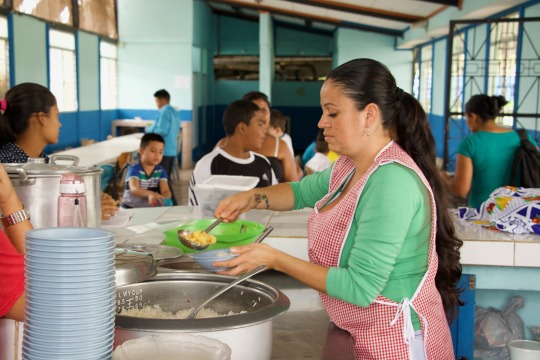
But today you are best known for your mission to end corneal blindness by 2035, where did that mission come from?
Tej Kohli - In 2010 I was invited to fund donor corneal transplants at Niramaya Hospital in India. There is no history of blindness in my family and corneal blindness is not something that I had known a huge amount about before then. Nowadays I consider myself something of an expert. I was present in 2010 as the recipient of a corneal transplant that I had funded - a 50-year-old man who had been blind for decades - had his bandages removed. The man was able to see his wife and grown up children for the first time in decades.
That was a life changing moment for him and also for me and was my affirmation that having enjoyed so much rapid success in the late 1990’s and early 2000’s, I now wanted to use that success to eliminate corneal blindness. I felt it was my calling.
Another one of the reasons that corneal blindness resonated so strongly with me is because it is at its heart it is a poverty driven ailment. 75% of corneal blindness is either preventable or treatable. But when it is left untreated, it impedes the ability of entire families to become economically successful in communities that are already impoverished. NGOs do not reach a majority of the remote and rural communities in India. In communities that are underserved for healthcare provision due to their remoteness or poverty, there is a huge treatment gap.
The other challenge with corneal blindness, is that because it’s not life threatening, it attracts less attention than some other global health issues. But the social and economic impact of restoring someone’s vision is immense. It changes families forever. That’s why I became determined to make a difference. And by 2015 I was funding so many corneal transplant operations at Niramaya that a bigger facility was needed.
Is that when the Tej Kohli Cornea Institute project was started?
Tej Kohli - The Tej Kohli Cornea Institute in Hyderabad was the biggest project that the Tej Kohli Foundation had ever embarked upon. It opened in late 2015 and by November 2019 it had welcomed more than 223,404 outpatients and completed more than 43,255 surgeries.
People living with corneal blindness or visual impairment in India were often living in total poverty and in some instances could not even afford the train fare to travel to see a doctor, let alone to pay for a complex corneal transplant operation. We treated anyone referred to the Tej Kohli Cornea Institute for free regardless of who they were. It meant that we were able to help people who had been economically ‘shut out’ from the life changing treatment.
There was one girl who was the same age as my daughter whose vision was so poor that she was nearly blind. I was visiting Hyderbad and met her just after she had received her corneal transplant. She gave me a big hug and I couldn’t help thinking how I would feel if this was my daughter. After that I couldn’t stop thinking about how many others like her were still out there. Knowing that I could help them felt like a big responsibility that I wanted to rise to.
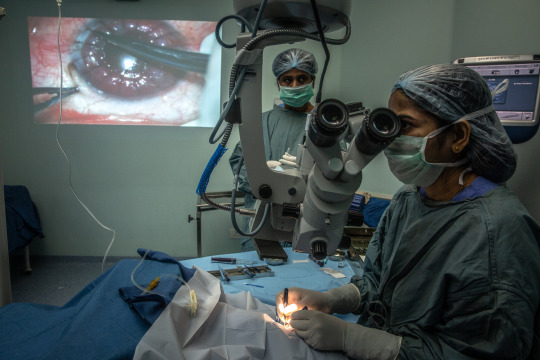
The focus of the Tej Kohli Cornea Institute is in India, but you haven’t lived in India for many decades. What is it that keeps your focus on India?
Tej Kohli - ‘First world’ problems are invariably the ones which it would be relatively expensive to solve. By contrast, high rates of poverty mean that many developing countries are plagued by diseases that it would cost the ‘first world’ comparatively tiny sums to control. In 2018 India commenced the world’s largest experiment in Universal healthcare when the Government granted 500 million people the entitlement to free health insurance overnight.
This will mean that those living below the poverty line in India will no longer have to pay for hospital treatments that would until now have pushed them into crippling debts. But whilst on the surface this is a hugely positive step forward, too much optimism entirely ignores the fact that it will still take many decades and billions of dollars to bring all of India’s healthcare systems up to the equivalent standard of that in the West. Until then, highly pervasive treatment gaps will continue to permeate the poorest communities.
My own focus on India as a philanthropist actually has nothing to do with my own heritage. Unfortunately, India is an epicentre of poverty-driven corneal blindness, and so it is the obvious place for us to be in our mission to combat this form of blindness, the vast proportion of which is either avoidable or treatable. But closing the treatment gaps is about more than money – it is also about logistics, resources, education, knowledge, cultural understanding and having a deep reach into communities. Does my heritage help with this? Yes, a little.
youtube
But in 2020 you announced that you were going to shift your focus away from these direct interventions in favour of finding cures. Why?
Tej Kohli – What has always been abundantly clear from the beginning is the sheer magnitude of the task of closing the corneal blindness treatment gap. I have always felt that official data is incomplete and so in reality there could be ten million people in the world living needlessly with corneal blindness. Most of them are in remote and rural communities across many different countries speaking different languages and with different systems in place.
You simply cannot eliminate corneal blindness by relying on transplantation surgery. Transplantation is too expensive, too complex and too inaccessible for most of the people who need it. The only way to eliminate corneal blindness by 2035 is to bring to market a novel solution that is affordable, scalable and accessible in all circumstances. What you need is a solution that can be applied by ophthalmologists or nurses without surgical intervention.
Finding that ‘universal’ solution is not something that we have just embarked upon: we have been working on it for years and today we have our own intellectual property which we have developed ‘in house’ as well as sponsoring the projects of third parties at major institutions. To begin with we tried to synthesise new corneas from yeast and then later from peptides. We were able to create them, but the rejection rate was too high, and neither solution would have removed the need for invasive sutures and expensive surgery.
It took until 2019 before we achieved a breakthrough when we created a proprietary regenerative solution, which in theory, could be applied using a syringe and cause the cornea to ‘regenerate’ and repair itself. Subject to regulatory approvals, this ‘universal solution’ is now years rather than decades away and could be relevant to more than one third of people with corneal blindness.
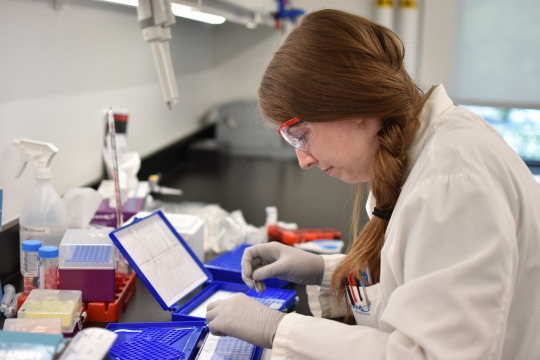
The “major institution” where you are sponsoring projects, is that Harvard Medical School?
Tej Kohli – Actually the Tej Kohli Cornea Program resides at Massachusetts Eye and Ear in Boston, which is a teaching hospital of Harvard Medical School. It is Harvard professors from the Department of Ophthalmology who lead the research that we sponsor at Mass. Eye and Ear, but our donations do directly to the hospital and it is they who administer the spending.
I donated $2m in 2019 to support the development of innovative technologies to improve medical diagnoses and treatments of corneal blindness. That money is going toward two major projects, one being similar to our own in-house project, and the other utilising nano string technologies to aid early diagnostics and preventative treatment. The funds are also used to provide seed funding to projects that address unmet medical needs in ophthalmology. In my mind the first $2m is just the start and we will do more together in the future too.
In 2019 we also inaugurated the Tej Kohli Cornea Institute UK Centre of Innovation in the United Kingdom. The Institute is building a research network to bring scientific expertise together and is also harnessing the best of British innovation to bridge the corneal blindness treatment gap in poor communities by awarding grants to UK-based technological and scientific projects. Decisions are made by an advisory board of UK experts in Ophthalmology.
youtube
Recently you returned to your earliest days of feeding children by launching food support programs in the UK. Why?
Tej Kohli - in the Spring of 2020 the world was plunged into a global crisis due to the Coronavirus. The pandemic required an emergency response of immediate interventions to alleviate individual human suffering. We had for a long time been formulating plans for how we could get involved in the mission to combat holiday hunger in the UK. When the crisis hit we had to bring those plans forward and play our part in supporting the local community.
The Tej Kohli Foundation partnered with community groups to create capacity to deliver 100,000 cooked meals each week to any charities or volunteer groups who need more free food to distribute into their local community. We also created the ‘YouCube’ box, a youth-focused food initiative that aims to ‘repackage’ food provision as an off-the-shelf initiative that existing charity and volunteer groups can adopt to combat hunger in their community.
Now the Tej Kohli Foundation aspires to use the organisational memory that has been developed during this period and the deep community connectivity of the scheme to combat ‘holiday hunger’ amongst children.
You also donated $100,000 toward the development of a vaccine for COVID-19, what motivated that?
Tej Kohli - I donated $100,000 of emergency funding to Harvard Medical School researchers based at the Massachusetts Eye and Ear Hospital in Boston. They had developed a novel and experimental gene-based vaccine which utilises a harmless ‘Trojan horse’ virus as a carrier to bring a tiny piece of the DNA of SARS-CoVid-2 into a patient’s cells, building a protein that stimulates their immune system to fight future infections. I think it is a promising solution to a major global problem, and I am hopeful that it will prove successful.
youtube
Your ‘Future Bionics’ program is funding 3D-printed bionic arms for young people in the UK. How did you arrive at this project?
Tej Kohli – I am immensely proud of our Future Bionics project. It captures so elegantly what the Tej Kohli Foundation is all about: making direct interventions to improve people’s lives using technology, with a particular focus on younger people with their entire life ahead of them. The project came about when I had lunch with the CEO of the company that make the bionic arms and he told me that a lot of families turn to crowdfunding because they cannot afford to purchase one of the arms for their child, and that most of this crowdfunding fails.
The first arm was delivered to a 10-year-old from Blackburn called Jacob as an early Christmas present. He has set a shining example and is a fine young man who is a great role model to other young people. And since then we are working our way through to provide arms to ten young people to begin with. I hope we can continue the program after that, but we will have to take a view on the cost versus the impact once that the current tranche is completed.
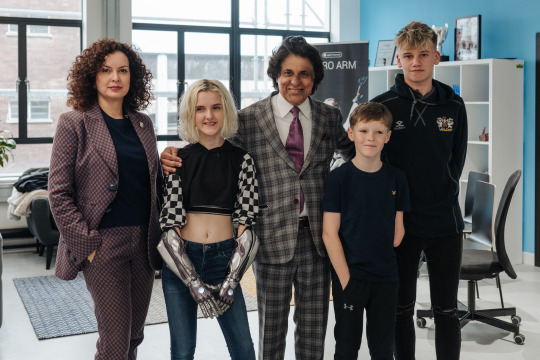
Why do you place so much faith and emphasis into technology?
Tej Kohli – you should never underestimate the role of technology in making the world a better place. We are living through an unprecedented time in human history where a chain reaction of rapid technological development across science and technology is unlocking unprecedented new opportunities to solve major human problems. Technologists can look out across the vista of a hugely rich and fertile landscape of new opportunities to improve human life. Many new and novel solutions are within grasp and simply need to be incubated and ‘proven’ to stimulate their widespread adoption.
Many technologists and entrepreneurs have built successful commercial enterprises or pioneered new technology solutions before. It’s my belief that this expertise is absolutely critical for unlocking the potential of these new and frontier technologies in a way that can have an exponential global impact in terms of solving human problems and improving human life.
I have long been fascinated by deep tech and new frontier technologies. When I started my payment gateways company in Costa Rica in 1999 we were figuring out frontier technologies and combining them to build brand solutions and applications. By the time that I left in 2006 my company employed armies of software developers. And this experience as a technologist is now also part of the DNA of my objectives and ambitions as a philanthropist.
youtube
It was Peter Thiel who noted that “We wanted flying cars, instead we got 140 characters”. Is there a risk that technology will not deliver in the ways that you expect?
Tej Kohli - My real point is that we are now at a watershed moment where the opportunity is to innovate solutions that could eliminate specific areas of human suffering entirely, rather than merely alleviating them. I strongly believe that AI and ‘humanitarian robotics’ have the potential to drive innovations which will alleviate human suffering and hardship, both directly and indirectly. I also believe that humanitarian efforts the world over will be greatly advanced by these emerging technologies as they continue their exponential growth.
That’s why earlier this year I established a new incubator to back scientific projects and commercial ventures that were targeting solutions to corneal blindness, with the caveat that those solutions must be affordable, scalable and accessible in the world’s poorest countries.
You have predicted that artificial intelligence could become a $150 trillion economy within five years, which is ten times more than the current combined output of India and China?
Tej Kohli - Artificial intelligence, and also biotechnology for that matter, are both frontier technologies that are locked into an exponential growth trajectory. The cost of deciphering the human genome has dropped from $3 billion in 2001, to about $1,000 today and what took many months ten years ago can now be done in less than one hour.
I believe that AI will be so manifest within all aspects of life, and that the applications are so broad, that the AI economy will worth four times that of the global Internet economy, which is today worth approximately $50 trillion. AI is also already transforming developing countries. In Nepal, machine learning has been utilised to map and prioritize reconstruction needs after earthquakes. In Africa AI tutors are helping young students to catch up on coursework. NGOs and humanitarian aid agencies are using big data analytics to optimise the delivery of supplies for refugees fleeing conflict and other hardships. And in India rural farmers are being encouraged to use AI to improve crop yields and boost profits.
Technological innovations like these bring us much closer to achieving the United Nations Sustainable Development Goals on issues like eradicating poverty, ending health-care inequality, increasing access to schooling, and combating global warming. And yet the world is only just scratching the surface of what these new technologies could do for human progress.
Your Kohli Ventures investment vehicle focuses on impact investment. Where does philanthropy end and impact investment begin?
Tej Kohli – That’s a good question. Impact investment looks at the double bottom line of profit and social impact. Philanthropy is a good way to spend wealth, but somewhere along the line you need to first generate that wealth. So why not, when the circumstances are right, try to do both at the same time? Take for example Detraxi, a Florida-based biotech company that I wholly own. It’s a commercial venture but could have a significant humanitarian impact.
More than 100,800 solid organ transplants are performed each year worldwide according to the World Health Organisation. Eight lives can potentially be saved by just one organ donor. Demand far outstrips supply, yet thousands of organs get discarded every single year though wastage due to the practical difficulties of preserving and transporting organs. Imagine if you could solve that problem, it would be a good business that would also save thousands of lives? Well that is what we are trying to do by bringing the Detraxi solution to the market.
But which is more important, philanthropy or impact investment?
Tej Kohli - It was Sir Ronald Cohen who said that “the world must change but we cannot change it by throwing money at old ideas that no longer work. To change the world, we must change how we do business, starting with where and when we invest our money”. Can you imagine a world where every investment decision made by every institution also weighed up the human or social impact of that investment? The consequences would be immense.
Worldwide impact investment is currently was worth around $715 billion in 2018, but the International Finance Corporation estimates that based on current demand from investors’ total demand is nearer to $26 trillion, which is fifty times larger. Impact investing already has the power to solve issues that are often beyond governments. And I am convinced that impact investing is one of the best ways of funding the technology-led changes that the world urgently needs in order to solve some of our biggest challenges.
What have been your favourite impact investments so far?
Tej Kohli – my impact investment portfolio is doing very well indeed, but I deliberately do not disclose my investments since having my name associated can eb a hinderance. And anyway, the focus should be the founders and entrepreneurs at those venture, not on me. One of the largest investments I have made was in 2019 when I committed $100m into the Rewired robotics-focused venture studio ‘with a humanitarian bent’.
Rewired is a Switzerland based organisation, so I do not have any direct influence over what they invest in and their portfolio is also a tightly guarded secret. But based on the Rewired investments that are already in the public domain, one of my favourites is Aromyx based in Silicon Valley. Aromyx was originally initiated by the Defense Advanced Research Projects Agency. The company is creating new modalities of data that have the potential to be disruptive across many sectors and applications. In 2019 Aromyx completed a large-scale study with one of the world’s largest chemical companies with a view to deploying Aromyx into the recycling process to improve plastics recycling rates by over 90%.
Other investments publicised by Rewired include Seldon, which is at the heart of accelerating the adoption of machine learning to solve some of the world’s most challenging problems. There is also Raptor Maps, which was founded by MIT Engineers and makes it simple and affordable for solar companies to adopt drone technology as a tool to increase performance. Open Bionics is enhancing the lives of all humans everywhere with its next generation of 3D-printed ‘bionic’ prosthetics. And Elementary Robotics is re-engineering automation intelligence through its deep learning artificial intelligence software.
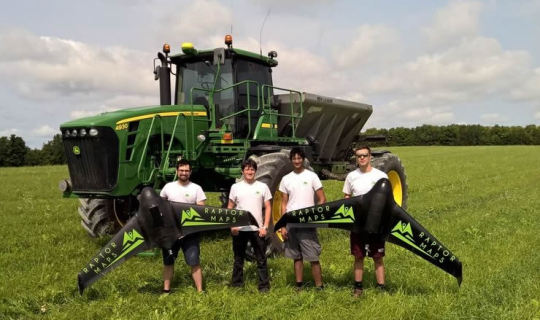
You have said before that you believe your children, who are teenagers, could live to be at least 125 years old. What will the world be like by 2125?
Tej Kohli - If I look at how the world has changed since I graduated in 1980, and given the acceleration of technological and human progress, I think it’s impossible to imagine the world in 2125. Thanks to economic growth the world is already on track to end extreme poverty by 2030, so perhaps the next 100 years of human history will see humanity unlocking the latent potential that has always been restrained by global inequality.
Of course, there are still major human challenges such as over population, sustainability and climate change that need dealing with. But even during the next decade AI will change every aspect of our lives. So by 2125 I am optimistic that technology will have unlocked even more solutions to these major global challenges.
Time will tell. What I am certain is that the opportunity is right in front of us, and it is for all of us to master it for the betterment of all of humanity.

For more information about Tej Kohli visit:
Tej Kohli official website: http://www.TejKohli.com
Tej Kohli Foundation official website: http://www.TejKohliFoundation.com
Kohli Ventures official website: http://www.KohliVentures.com
Tej Kohli personal blog: https://medium.com/tej-kohli
Tej Kohli Foundation YouTube: https://www.youtube.com/c/tejkohlifoundation
@MrTejKohl on Twitter: https://twitter.com/mrtejkohli
@MrTejKohli on Facebook: https://www.facebook.com/mrtejkohli
Tej Kohli Amazon Author Profile: https://www.amazon.co.uk/Tej-Kohli/e/B08CY13FNR
Tej Kohli Telegraph profile: https://www.telegraph.co.uk/technology/2019/10/04/tej-kohli-indian-tech-billionaire-plans-turbocharge-britains/
1 note
·
View note
Text
Implementing Green Business Practices
Running a business that has green credential, but that is also profitable, is no small task. It is important to remember that “going green” need not mean that your business cease to be profitable or competitive. No business, whether large or small, should lose focus on revenue – this is the essence of business, after all.
Nonetheless, it is of vital importance that we are proactive about environmental efficiencies.
You may choose to introduce green policies within your business or to take measures to encourage green behavior in your customers - for example, Hewlett Packard makes it convenient for consumers to recycle their old ink cartridges and used equipment. Either way, taking steps to reduce the harm your business does to the environment is laudable, and must be encouraged.
Whatever your policies and however numerous, it is important to ensure that all initiatives are well-designed, realistic and effective.
Planning green policies for businesses
It is important to have a green strategy in place prior to implementation.
The first stage is to do some research into legislative changes regarding environmental policies. You may find that you’re entitled to some governmental aid or incentives, that you’re not doing something that you should, or that your green policy is technically illegal.
Next, assess the impact that your business is currently having on the environment. How big are your carbon and environmental footprints? The answer will help you to set achievable green goals - footprint calculators can be accessed via the internet.
Think carefully about every suggested eco-friendly policy and consider how they will be implemented and by whom.
No initiative should be so difficult to execute that you drain your financial resources. Nor should anything be so complicated that employees fail to grasp the process, or simply fail to care. To ensure that something gets done, it has to be appealing, straightforward and realistic.
Approach your eco-friendly strategy as you would any other business decision. Ensure that you:
Do your research
Set appropriate goals
Know what tools you need and where to access them
Have assessed the cost of your policies and weighed the cost to benefit ratio
Have clearly defined the boundaries for green business practices
Your strategy can be simple or complex depending on your resources and workable reality. Remember, even small changes can make a big difference. For example, it is estimated that if every UK office worker used just one less staple per year, it would save 120 tons of steel.
Cutting back for big impact
Before you implement extensive environmental policies, consider on what things you can cut back. This is probably the most cautious and affective starting point for any sized business.
Consider creating an environmental committee within your business – this will particularly useful if your business is fairly large.
Choose people that are already interested in environmental issues, as well as those who are sceptics. In any decision-making committee it is important to have people who will point out the flaws in your plans – this can only help you be as thorough as possible in the planning and implementation of your environmental policies.
Start by cutting back on paper usage:
Global paper consumption is on the rise.
Paper represents one of the biggest components of solid waste in landfills.
When paper decomposes in a landfill, it releases methane, a greenhouse gas 23 times more potent than carbon dioxide.
The costs of using paper in the office can run 13 to 31 times the cost of purchasing the paper.
Paper constitutes roughly 35 % of the world’s waste.
Making minimal cutbacks on paper usage can have significant outcomes. For example, Citigroup, the financial services company, calculated that if each employee used double-sided copying once a week, thereby conserving just one sheet a paper per employee per week, the firm would save $700,000 each year.
Cutting back on paper usage will save time and money. Instead of sending letters, send emails; use digital procedures to pay bills, etc. By setting your printer to automatically printing double sided, you will find that you save surprising amounts of money. And ensure that there are plenty of recycling bins in your office space.
All of us have a duty to the planet but it easy to forget this when we are at work. At work, we assign responsibility to others, to those in charge. This is why green business policies are so important. Business owners must take charge and ensure that green policies are sensible, workable and impactful. Small actions can make the world of difference.
Following on from his recent investment in Zynergy, Global entrepreneur Tej Kohli, CEO of Kohli Ventures, Tej Kohli Real Estate and Tej Kohli Foundation says “Technology will continue to advance and push the dial in the renewable energy sector. The key is in finding those at the cutting edge to ensure first mover advantage”
0 notes
Photo

Time Management by Tej Kohli
Tej Kohli gives us a quick rundown of why time management matters to him and why it is so important for running a successful business:
1. Time is limited – it doesn’t matter how clever or rich you are, we all only get 24 hours in a day so use them wisely
2. Allocating time to task helps you to focus on the task in hand
3. Giving deadlines helps ensure that things will happen
4. Procrastination gives others the opportunity to overtake
5. Ensures others don’t get put under undue pressure because everything is done last minute
As a global entrepreneur, Tej Kohli knows that if you look after the seconds, the hours will look after themselves.
0 notes
Text
Ozone Real Estate, Abu Dhabi’s architectural cool
The world’s top architects are flocking to Abu Dhabi. To name but a few stunning projects, which are under construction, Frank Gehry, who designed the striking Guggenheim gallery in Bilbao, has styled Abu Dhabi’s Guggenheim art gallery on Saadiyat Island, a new cultural hub and will also have a performing arts centre by Zaha Hadid and Sir Norman Foster will be directing the design of the Zayed National Museum. Tej Kohli considers that this dedication to quality and aesthetics shows Abu Dhabi’s commitment to become a destination where quality of life is at its focus.
0 notes